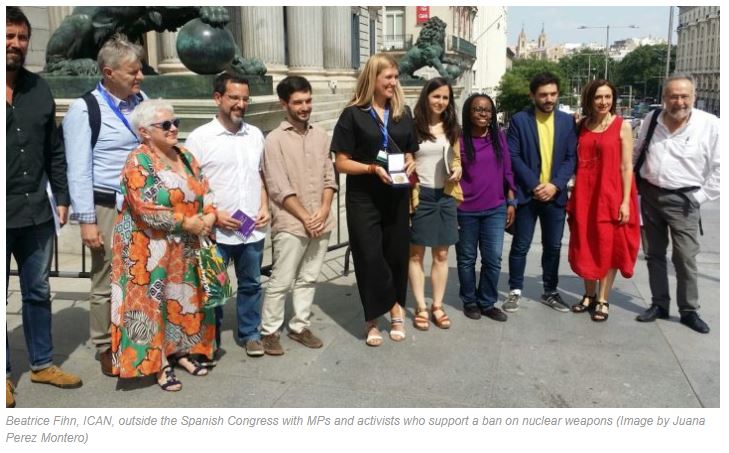Spain: Why would a country that has banned biological and chemical weapons not ban nuclear weapons?
By Tony Robinson, Pressenza, 29 June 2018.

This was the question posed this week in Madrid by Beatrice Fihn, Executive Director of ICAN to parliamentarians, mayors, international diplomats, students and activists from a range of civil society organisations during a packed two days of activities in the Spanish capital to increase support for the Treaty on the Prohibition of Nuclear Weapons at all levels of government and to raise awareness of the risks and dangers of nuclear weapons within the general population.
At the invitation of Pedro Arrojo, environmental activist and Spanish Member of Parliament, and activists from the organisations World without Wars and Violence and the Women’s International League for Peace and Freedom (WILPF), Fihn came to formally receive the endorsements of 91 congressmen and women from 6 different political groupings within parliament for ICAN’s parliamentary pledge to “work for the signature and ratification of this landmark treaty…, as we consider the abolition of nuclear weapons to be a global public good of the highest order and an essential step to promote the security and well-being of all peoples.”
During the press conference in which the signatures were handed over, Pablo Bustinduy, coordinator of Podemos’s International Secretariat, called the pledge an invitation to “challenge the view that the best thing that Spain can do in its international relations is to assume a subordinate position, subject to the mandates of NATO and the USA.” He added, “Spain has a formidable opportunity ahead to take on the role that corresponds to it in the geopolitical sphere. Spain has a capacity of influence, action, intervention and leadership in international relations which it is more necessary than ever to put at the service of democracy, human rights and international law.” He concluded, “We have two years of this parliament ahead of us in which to develop a strategy, by all possible means and in a pacifist spirit, until Spain signs and ratifies this treaty.”
After the very cordial meeting in Congress in which ideas were exchanged on how to create a political majority capable of taking the necessary steps so that Spain signs and ratifies the Ban Treaty without violating Spain’s NATO obligations, events moved on to the Complutense University of Madrid where ICAN delivered a lecture to an audience of 200 people after initial words of welcome from Carlos Andradas Heranz, rector of the University, Manuela Mesa from WILPF and Federico Mayor Zaragoza, former director general of UNESCO.
In her address, Fihn pointed out that “nothing in the North Atlantic Treaty signed EU states up to a nuclear instability doctrine based on luck and risk. Nothing in our collective defence should force us to participate in using nuclear weapons on civilians. That is the opposite of cooperative security.”
Pointing out the hypocrisy in supporting some weapons of mass destruction and not others, she added, “Neither the Spanish people nor their representatives in government would consider it legitimate to abstain from joining the chemical or biological weapons ban because the US wanted to maintain a ‘Mustard Gas Umbrella’, or if the UK and France planned to use a bio-engineered version of the plague for ‘Extended Deterrence’. Spain would not remain silent while three NATO allies built brand new chemical weapons with the goal of making it easier to use them. But that is exactly what the government is doing in the case of the weapons of mass destructions that one of their inventors labelled ‘the destroyer of worlds’.”
On Thursday, Fihn’s visit culminated with a meeting at Madrid City Council with organisers of the II World Forum on Urban Violence and Education for Co-existence and Peace to see how best to promote the Ban Treaty to the 500 mayors from around the world who will participate. This was followed by a meeting with Manuela Carmena, mayor of Madrid, who pledged to ask the city council to formally support the treaty.


